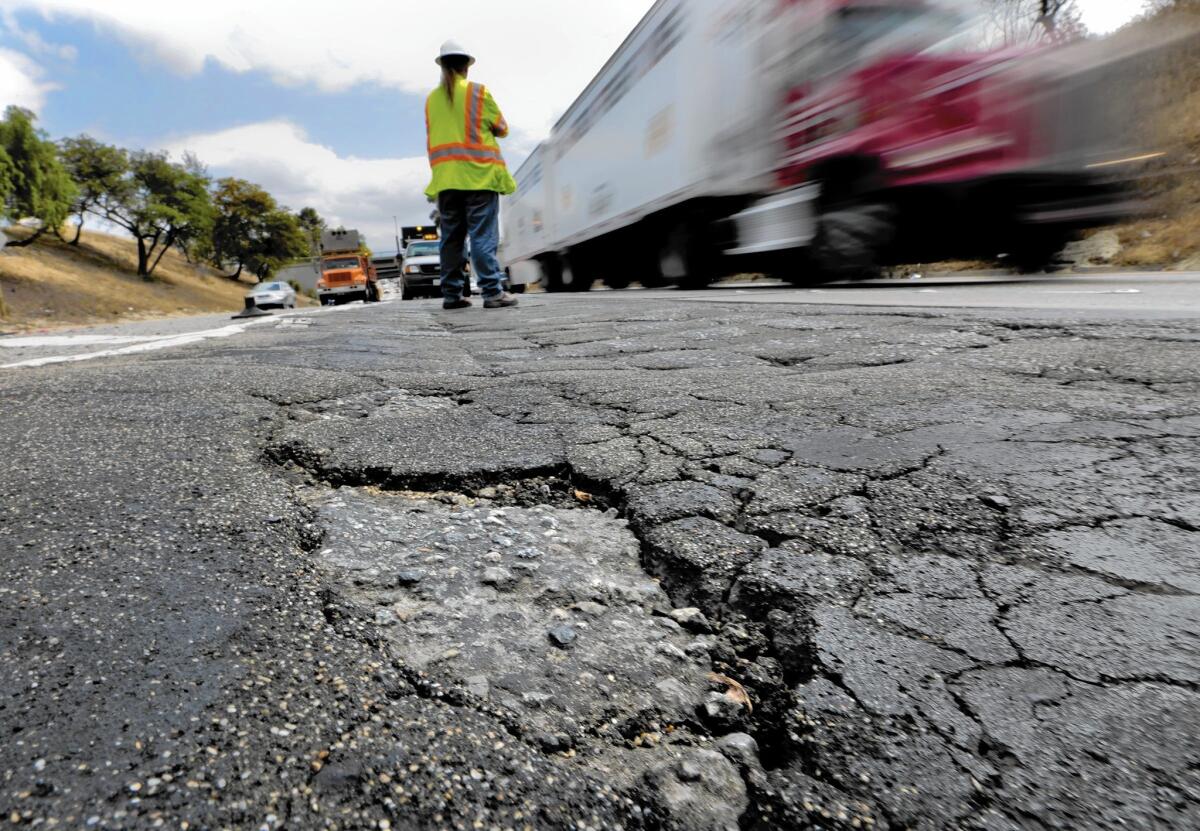Capitol Journal: California can’t stop global warming alone, but it can fix its highways

- Share via
The governor is in Europe saving the planet. The Legislature is on a monthlong vacation. And we motorists keep getting our cars beat up on California highways.
Don’t read me wrong. Somebody — lots of people — needs to rescue Earth from excessive global warming. It’s crucial, yes, but beyond one state government’s capability.
And we all need to take time off periodically. I’m about to myself, potholed roads permitting.
It’s just that when Gov. Jerry Brown was reelected and a new Legislature chosen last year, high on the voters’ assignment list probably was not reducing greenhouse gas emissions. Fixing this state’s decaying infrastructure, especially roads and bridges, undoubtedly was.
Hopefully our lawmakers will be driving around California enough on their vacations to feel the roadbeds crumbling beneath them.
Two years ago, the American Society of Civil Engineers reported that California’s road surfaces cost drivers nearly $14 billion a year in repairs and operating costs. That works out to $586 per driver. Nearly 30% of the state’s bridges were deficient or obsolete, the organization said.
We saw that last weekend when heavy rain washed out a bridge on the 10 Freeway east of Coachella.
Brian Kelly, head of the state Transportation Agency, says “41% of California’s pavement is distressed or needs serious maintenance, ranking among the worst in the nation. The problem has been decades in the making. We’ve fallen further and further behind.”
California practically invented freeways. Ours used to be the best. They started going downhill the first time Brown was governor, when he thumbed his nose at auto travel.
But Brown this year seems to have seen the light. In his January state-of-the-state address, the governor estimated the backlog of road maintenance at $59 billion, said the state kitty for repairs was practically on empty and added: “We must do something about it.”
The Legislature didn’t. So in June, Brown called a so-called special session to raise more money for road fixing.
The governor put out a press release, but not a funding plan. The Legislature held some hearings but is nowhere close to an agreement.
Privately in the Capitol, there’s pessimism a deal will ever be reached. That’s because the solution is both to raise taxes from motorists, which Republicans dislike, and to dip into the general fund, which Democrats oppose because that would cut into programs for poor people. Any tax hike would require a two-thirds vote and thus some GOP help.
Publicly, there’s cautious optimism about a potential compromise.
“It’s a coin toss,” says Senate Republican leader Bob Huff of Diamond Bar. “The governor has got to lead the charge and just be pragmatic. Everybody has to have some skin in the game.”
The Legislature will reconvene Aug. 17 and quit for the year shortly after Labor Day.
At least everyone agrees there’s a big problem.
“That’s a good place to start,” says Assembly Republican Leader Kristin Olsen of Modesto. “Oftentimes going into negotiations, there’s not even an agreement there is a problem.”
The problem is well known.
Highway repairs rely on an 18-cent-per-gallon gasoline tax that was set in the early 1990s and never adjusted for inflation. Now its buying power is only 11 cents. Additionally, a motorist today buys less gas than 25 years ago because vehicles are more fuel-efficient. Brown says the tax is generating $2.3 billion annually for repairs, but $5.7 billion more is needed.
The leading Democratic legislator on this is Senate Transportation Committee Chairman Jim Beall of San Jose.
He has introduced legislation that would raise the gas tax by 12 cents and readjust it for inflation every three years.
“There might be some Republican support for that,” Huff says, depending on “the rest of the legislative stew.”
Beall also would create a “road maintenance” fee averaging $35 annually, based on a car’s weight. He doesn’t dare try to raise the controversial vehicle license fee (VLF). Gov. Gray Davis did that and got recalled.
Additionally, the senator would boost the separate vehicle registration fee by $35. “That sounds an awful lot like VLF,” Huff says.
And because heavier electric cars tear up the roads even more than gas-burning vehicles, Beall would sock them with an annual $100 fee. That’s fine with Huff. On that, the GOP leader says, “there’s traction.”
But not with Brown. He’s promoting electric vehicles and doesn’t want to discourage their sale. “We’ll see,” Beall says. “We’ve got to spread the pain, everybody paying their fair share.”
Beall’s bill would raise more than $4 billion annually. Most important, this would be pay-as-you-go financing for highway maintenance. The state wouldn’t need to sell bonds, with interest costs doubling the ticket price.
Republicans also have introduced proposals. Their main goal is to assure that any taxes paid by motorists are used on highways, not siphoned off for other programs.
Truck weight fees, for example, have been diverted into the general fund. But they’re paying off transportation bonds. So each side has a good argument.
Huff also wants to use earnings from cap-and-trade — licenses to emit greenhouse gases — for highway work. Democrats say using that money for, in effect, burning fossil fuel is illogical.
There seems to be plenty of room for compromise.
But first the governor and legislative leaders will need to focus less globally and more on down-to-earth problems immediately affecting Californians.
Twitter: @LATimesSkelton
More to Read
Sign up for Essential California
The most important California stories and recommendations in your inbox every morning.
You may occasionally receive promotional content from the Los Angeles Times.











